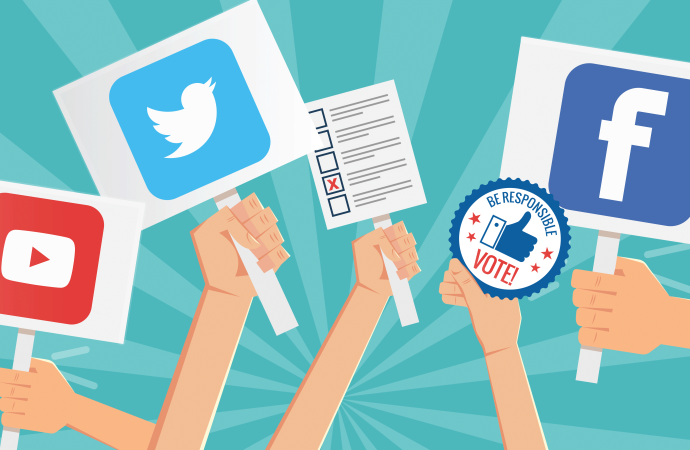In the digital era, social media has become an indispensable tool for communication, information dissemination, and social interaction. Over the past decade, its influence has extended far beyond personal connections to become a significant force in political engagement in the United States. This article explores how social media is driving political engagement, highlighting both the
In the digital era, social media has become an indispensable tool for communication, information dissemination, and social interaction. Over the past decade, its influence has extended far beyond personal connections to become a significant force in political engagement in the United States. This article explores how social media is driving political engagement, highlighting both the opportunities and challenges it presents.
The Rise of Social Media in Politics
Social media platforms like Facebook, Twitter, Instagram, and more recently TikTok, have revolutionized the way political information is shared and consumed. Unlike traditional media, which often serves as a one-way communication channel, social media allows for interactive and real-time engagement. This democratization of information has empowered individuals and groups to participate in political discourse like never before.
Accessibility and Reach
One of the most significant contributions of social media to political engagement is its unparalleled reach. According to the Pew Research Center, approximately 72% of U.S. adults use social media, with a substantial portion utilizing these platforms to get news and information. This broad accessibility means that political messages can reach a vast audience quickly and efficiently.
Social media also lowers the barriers to political participation. In the past, engaging in political activities often required physical presence or significant resources. Today, a tweet, a post, or a shared article can serve as a form of political engagement, making it easier for individuals to voice their opinions and mobilize around issues that matter to them.
Mobilization and Activism
Social media has proven to be a powerful tool for mobilizing political activism. Movements such as Black Lives Matter and #MeToo have gained momentum and visibility largely through social media platforms. These movements have utilized hashtags to create a unified message and to organize protests, rallies, and other forms of collective action.
Moreover, social media enables rapid response to political events. For example, during election seasons, platforms are flooded with information on candidates, policies, and voting procedures. This real-time dissemination of information helps keep the electorate informed and engaged.
Political Campaigns and Advertising
Political campaigns have increasingly turned to social media to reach potential voters. The 2008 and 2012 campaigns of Barack Obama are often cited as pioneering in their use of social media for political engagement. Since then, the trend has only grown, with candidates using platforms to communicate directly with voters, bypassing traditional media gatekeepers.
Social media advertising allows for highly targeted campaigns. Platforms like Facebook and Instagram offer sophisticated tools for targeting specific demographics, interests, and even behaviors. This precision enables political campaigns to tailor their messages to resonate with particular segments of the electorate, thereby increasing the effectiveness of their outreach efforts.
The Role of Influencers and Opinion Leaders
Another facet of social media’s impact on political engagement is the role of influencers and opinion leaders. These individuals, who often have large followings, can sway public opinion and mobilize their followers around political causes. Whether they are celebrities, activists, or subject matter experts, their endorsements and opinions can significantly impact political discourse.

Picture by: Yandex.com
Challenges and Concerns
While social media has undoubtedly enhanced political engagement, it also presents several challenges. One of the most pressing issues is the spread of misinformation and fake news. The rapid dissemination of false information can mislead the public and distort political debates. Platforms have been criticized for not doing enough to combat this issue, although efforts are being made to improve fact-checking and content moderation.
Another concern is the echo chamber effect, where individuals are exposed primarily to information that reinforces their existing beliefs. This can lead to increased polarization and a fragmented public sphere. Algorithms that prioritize engagement often amplify this effect, as controversial and emotionally charged content tends to generate more interaction.
Privacy is another significant concern. The collection and use of personal data for political advertising have raised ethical and legal questions. The Cambridge Analytica scandal, where data from millions of Facebook users were harvested without consent for political purposes, highlighted the potential for abuse and the need for stricter regulations.
The Future of Political Engagement on Social Media
As social media continues to evolve, its role in political engagement is likely to grow even more significant. Emerging technologies such as artificial intelligence and machine learning could further enhance the ability to target and engage voters. However, these advancements also necessitate robust ethical guidelines and regulatory frameworks to ensure that they are used responsibly.
Moreover, as younger generations, who are digital natives, become more politically active, the importance of social media in shaping political engagement will only increase. These platforms will need to adapt to the changing landscape, balancing the need for free expression with the responsibility to prevent harm.
Conclusion
Social media has fundamentally transformed political engagement in the United States. Its ability to reach a wide audience, mobilize activism, and facilitate direct communication between politicians and the public has made it an indispensable tool in modern politics. However, the challenges it presents, including misinformation, polarization, and privacy concerns, cannot be overlooked. As we move forward, it will be crucial to harness the positive aspects of social media while addressing its drawbacks to foster a more informed and engaged electorate.
















